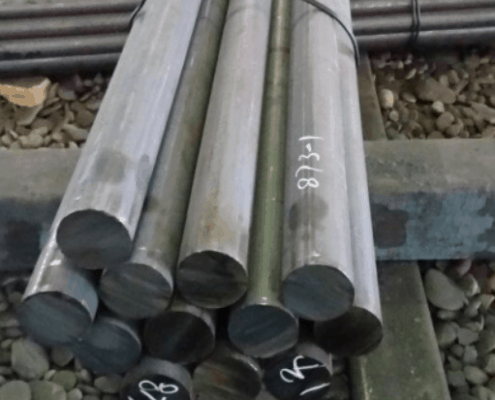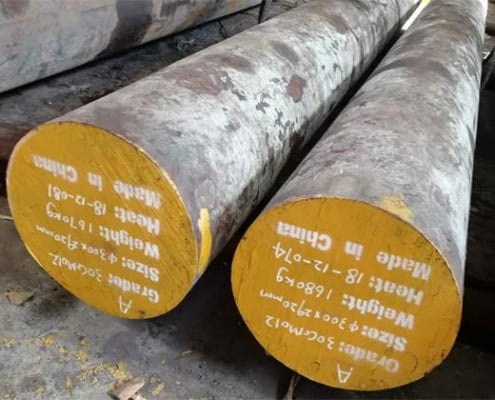C15 Steel|1.0401
C15 steel, also known by its numerical designation 1.0401, is a low-carbon steel widely used in various industries for its mechanical properties, machinability, and cost-effectiveness. This guide provides a detailed overview of C15 steel, addressing its composition, properties, applications, processing techniques, and more.
C15 steel offers a good balance of toughness, strength and ductility which is the most commonly available grade around the world.Although its mechanical properties are not very unique, it still can be easily formed, machined, welded and fabricated. C15 steel has excellent weldability and produces a uniform and harder case,and it is considered as the best steel for carburized parts.It may be hardened by carburizing and by other surface-hardening methods.It can attain typical surface hardness to HRC 58 by carburise.
What is C15 Steel (1.0401)?
C15 steel belongs to the carbon steel category, featuring a low carbon content that enhances its formability and weldability while maintaining sufficient strength for many applications. The material’s designation in different systems includes:
- EN 10083-2 (Europe): C15
- AISI (USA): 1015 (approximate equivalent)
- UNS: G10150
Its widespread use is attributed to its balance between affordability and mechanical performance, making it a popular choice for parts that require machining and surface hardening.
C15 Steel Supply Form & Size &Tolerance
| Form of Supply | Size(mm) | Length(mm) |
| Round bar | Φ6-Φ1000 | 3000-10000 |
| Square bar | 100 x 100-600×600 | 3000-6000 |
| Flat bar/Blcoks | Thickness :120-800 | 2000-6000 |
| Width:120-1500 |
| Surface Finish | Black-Forged | Black-Rolled | Rough Turned | Grinding | Polished | Peeled | Cold Drawn |
| Tolerance | (0,+5mm) | (0,+1mm) | (0,+3mm) | Best h9 | Best h11 | Best H11 | Best H11 |
C15 Steel Chemical Composition & Related Specifications
| Grade | C | Si | Mn | P | S |
| 1018 | 0.15-0.20 | 0.2-0.4 | 0.60-0.90 | ≤ 0.04 | ≤ 0.05 |
| Germany | UK | China | Japan |
| C15/1.0401 | 080A15 | 15# | S15C |
C15 Steel Mechanical Property
| Surface Finish | Tensile Strength Mpa | Yield Strength Mpa | Elongation, % | Hardness,HB |
| Bright Drawn | 430 – 750 | 340 – 600 | ≥ 12 | 120 – 220 |
| Smooth Turned | 410 – 560 | 230 – 330 | ≥22 | 120 – 170 |
C15 Steel Forging
Heat to 1150°C – 1280°C Hold until uniform Minimum forging temperature 900°C Air cooling after forged
C15 Steel Heat Treatment
- Normalising: 890–940°C°C,air cooling
- Annealing:870–910°C°C,furnace cooling
- Stress Relieving: 500–700°C,air cooling
- Carburising:880 –920°C
- Core Refining:780–820°C,Quench in water
- Case Hardening:780–820°C,Quench in water
- Carbonitriding:800°C – 875°C,Quench and Temper as required
C15 Steel Machinability
The machinability of C15 steel is rated at 62% of AISI 1112 carbon steel. Machining provides this material with a fine finish, with continuous and hard chips. It is possible to machine this steel in all conditions
C15 Steel Welding
C15 steel can be instantly welded by all the conventional welding processes,such as gas, oxyacetylene, resistance, and submerged melt welding.But welding is not recommended for this steel when it is carbonitrided and carburized.Low carbon welding electrodes are recommended in the welding procedure, and post-heating and pre-heating are not necessary. Pre-heating can be performed for sections over 50 mm. Post-weld stress relieving also has its own beneficial aspects like the pre-heating process.
C15 Steel Application
C15 is used in bending, crimping and swaging processes,and it is suitably used in applications that do not need high strength of alloy steels and high carbon.C15 is used to improve drilling, machining, threading and punching processes,and also can be used to prevent cracking in severe bends. TYPICAL APPLICATIONS:
- Shafts
- Spindles
- Pins
- Rods
- Sprocket assemblies
- Axles,bolts
- Fixtures, mounting plates ,spacers
- Machinery parts
Comparisons with Similar Steels
When selecting C15 steel, it is helpful to compare it with similar grades:
| Steel Grade | C15 (1.0401) | C22 (1.0402) | C10 (1.1121) |
|---|---|---|---|
| Carbon Content | 0.12–0.18% | 0.17–0.24% | 0.08–0.13% |
| Strength | Moderate | Higher | Lower |
| Hardening Ability | Limited | Moderate | Limited |
Certifications and Standards
To ensure quality, it is important to procure C15 steel from reliable suppliers who adhere to recognized standards:
- EN 10083-2: Technical delivery conditions for non-alloy steels.
- ISO 683-1: International standards for heat-treated steels.
- DIN Standards: For consistent quality and traceability.
Sustainability and Recycling
C15 steel is fully recyclable, contributing to a sustainable manufacturing cycle. Its low alloy content reduces energy consumption during recycling processes, aligning with global environmental goals.
FAQ on C15 Steel
1. Can C15 steel be used for heavy-load applications?
- While suitable for moderate loads, heavy-duty applications may require higher-strength steels like C22 or C45.
2. Is C15 steel rust-resistant?
- No, C15 steel lacks significant corrosion resistance and may require coatings or treatments in humid environments.
3. What industries benefit most from C15 steel?
- Automotive, general engineering, and construction industries frequently use C15 steel for cost-effective and machinable parts.
Conclusion
C15 steel (1.0401) is a reliable material for applications that require a balance of machinability, weldability, and moderate strength. By understanding its properties and capabilities, businesses can leverage this steel to optimize production costs without compromising quality.
For detailed information on sourcing or custom solutions using C15 steel, feel free to contact WALDUN Steel, your trusted supplier of high-quality alloy steels since 2005.
Related Other Steel
Page Contents
- What is C15 Steel (1.0401)?
- C15 Steel Supply Form & Size &Tolerance
- C15 Steel Chemical Composition & Related Specifications
- C15 Steel Mechanical Property
- C15 Steel Forging
- C15 Steel Heat Treatment
- C15 Steel Machinability
- C15 Steel Welding
- C15 Steel Application
- Comparisons with Similar Steels
- Certifications and Standards
- Sustainability and Recycling
- FAQ on C15 Steel
- Conclusion









